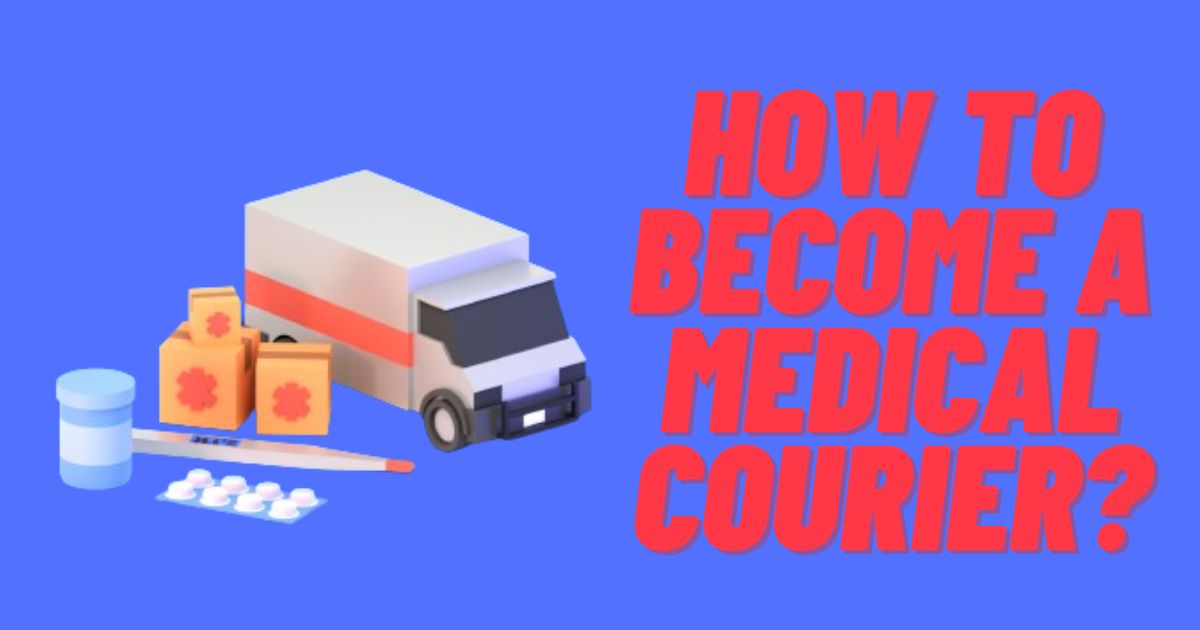In today’s fast-paced healthcare industry, the timely and secure transportation of medical materials is crucial. This is where medical couriers play a vital role, ensuring that life-saving specimens, test results, medications, and other sensitive items reach their destinations promptly and safely.
If you’re seeking a flexible career opportunity with the potential for growth, becoming a medical courier could be an excellent choice. In this comprehensive guide, we’ll explore everything you need to know about this rewarding profession, from the necessary qualifications and skills to the step-by-step process of becoming a certified medical courier.
What is a Medical Courier?
Medical couriers are professionals responsible for the safe and timely transportation of medical items such as lab specimens, test results, medications, and supplies between healthcare facilities, laboratories, pharmacies, and other medical organizations. They play a crucial role in ensuring the smooth functioning of the healthcare system by bridging the gap between different entities and facilitating the efficient delivery of critical medical materials.
How to Become a Certified Medical Courier? (Step-by-Step Procedure)
Meet the eligibility requirements
Before pursuing a career as a medical courier, it’s essential to meet the basic eligibility criteria set forth by most courier companies and healthcare organizations. While formal education is not always necessary, you’ll typically need to meet the following requirements:
- Be at least 21 years of age
- Possess a valid driver’s license with a clean driving record
- Have access to a reliable, insured, and inspected vehicle (car, SUV, or van) that’s less than 10 years old
- Demonstrate familiarity with the local area and excellent navigation skills
- Possess basic technological proficiency (comfortable using smartphones and apps)
Complete a medical courier training program
While not strictly mandatory, many aspiring medical couriers opt to enroll in a training program to gain a comprehensive understanding of the industry and the specific responsibilities of the role. These programs typically cover essential topics such as:
- Handling and transportation of medical specimens and materials
- Maintaining confidentiality and adhering to regulations like HIPAA
- Safe driving practices and route planning
- Customer service and communication skills
- Compliance with relevant guidelines and protocols
Completing a reputable training program can provide you with a solid foundation and increase your chances of success in this field.
Acquiring certification
Depending on the courier company or healthcare organization you plan to work with, you may be required to obtain specific certifications. The most common certifications for medical couriers include:
- HIPAA (Health Insurance Portability and Accountability Act) certification
- Bloodborne Pathogens certification
- Basic Life Support (BLS) certification (in some cases)
These certifications demonstrate your commitment to maintaining the highest standards of professionalism, confidentiality, and safety when handling sensitive medical materials.
Apply for medical courier jobs
With the necessary qualifications and certifications, individuals can begin applying for medical courier positions with reputable courier companies or healthcare organizations. Many companies offer flexible schedules and the opportunity to work as an independent contractor, allowing couriers to manage their own workload and hours.
Get the necessary equipment and vehicle
Medical couriers need a reliable vehicle that meets the company’s requirements, as well as specialized equipment such as insulated coolers, spill kits, and personal protective equipment (PPE) to ensure the safe transportation of medical materials.
Choose route planning software
Efficient route planning is crucial for medical couriers to ensure timely deliveries. Investing in reliable route planning software or apps can help optimize routes, avoid traffic congestion, and ensure prompt delivery of medical items.
What skills benefit medical couriers?
Successful medical couriers possess a combination of essential skills, including time management and organizational abilities, attention to detail, customer service skills, navigational expertise, adaptability, problem-solving skills, and physical stamina.
What are the Duties and Responsibilities of a Medical Courier?
Medical couriers are responsible for picking up and delivering medical specimens, test results, medications, supplies, and other sensitive materials from healthcare facilities, laboratories, pharmacies, and designated locations. They must maintain confidentiality, properly handle and store medical items, accurately document deliveries, communicate effectively with healthcare professionals, comply with regulations, maintain their vehicles, and provide exceptional customer service.
What are the Key Skills and Qualifications Required to Become a Medical Courier?
To become a medical courier, individuals typically need a valid driver’s license with a clean driving record, knowledge of the local area and navigation skills, physical stamina and the ability to lift weights, attention to detail and organizational skills, customer service and communication abilities, adaptability and problem-solving capabilities, technological proficiency, and relevant certifications such as HIPAA and Bloodborne Pathogens.
How Much Does it Cost to Become a Medical Courier?
The cost of becoming a medical courier can vary, but may include expenses for training programs (ranging from $200 to $800 or more), certifications ($25 to $200 each), a reliable vehicle and insurance, specialized equipment and supplies (from a few hundred to several thousand dollars), licensing and registration fees, and background checks or drug testing.
How Much Does a Medical Courier Earn on Average per Year?
| Annual Salary | Monthly Pay | Weekly Pay | Hourly Wage | |
| Top Earners | $82,000 | $6,833 | $1,576 | $39 |
| 75th Percentile | $63,000 | $5,250 | $1,211 | $30 |
| Average | $56,645 | $4,720 | $1,089 | $27 |
| 25th Percentile | $37,500 | $3,125 | $721 | $18 |
What are the Benefits of Becoming a Medical Courier?
Becoming a medical courier offers a range of benefits that can appeal to individuals seeking a flexible and rewarding career path. Here are some of the key advantages:
- Flexibility and independence: As a medical courier, you have the opportunity to work as an independent contractor, allowing you to set your own schedule and work hours. This flexibility can be particularly beneficial for those seeking a better work-life balance or those with other personal or family commitments.
- Entrepreneurial opportunities: Working as a medical courier provides the potential to build your own business and client base. As you gain experience and establish a reputation for reliable and efficient service, you may have the opportunity to expand your operations and potentially hire additional couriers.
- Job variety and mobility: Each day as a medical courier brings new challenges, different routes, and the opportunity to work with various healthcare facilities and organizations. This variety can make the job exciting and engaging, preventing monotony or boredom.
- Contribution to healthcare: Medical couriers play a vital role in the healthcare system by ensuring the timely and secure transportation of medical materials. This role can be personally fulfilling, knowing that your work directly contributes to the well-being of patients and the advancement of medical sciences.
- Potential for growth and advancement: As the healthcare industry continues to grow, the demand for reliable medical couriers is expected to increase. This can open up opportunities for career advancement, such as taking on supervisory or management roles within courier companies or healthcare organizations.
- Low barrier to entry: Becoming a medical courier generally requires minimal formal education or training, making it an accessible career option for individuals from various backgrounds. The primary requirements typically include a valid driver’s license, a reliable vehicle, and the necessary certifications or training.
- Potential for higher earnings: While earnings can vary, experienced and efficient medical couriers may have the potential to earn higher incomes, especially if they work in high-demand areas, offer specialized services, or have established a strong client base.
- Opportunity for travel: For those who enjoy exploring new areas, being a medical courier can provide the opportunity to travel within your region or even across the country, depending on the clients and healthcare organizations you work with.
- Sense of purpose: Knowing that your work directly contributes to the well-being of patients and the advancement of medical sciences can provide a sense of purpose and fulfillment.
Overall, the benefits of becoming a medical courier can make it an attractive career choice for individuals seeking flexibility, independence, and the opportunity to contribute to the healthcare industry while exploring entrepreneurial opportunities.
The Importance of Medical Couriers in Healthcare
Medical couriers play a vital role in the healthcare system by ensuring the efficient and secure transportation of critical medical materials. Their services are essential for maintaining the continuity of care and enabling healthcare providers to make informed decisions and provide timely treatment to patients.
Without reliable medical couriers, the flow of information and resources within the healthcare system would be severely disrupted, potentially leading to delays in diagnosis and treatment, compromising patient safety, and hindering medical research and advancements.
Navigating Regulations and Compliance
One of the key responsibilities of medical couriers is ensuring compliance with various regulations and guidelines governing the transportation of medical materials. These regulations, such as HIPAA (Health Insurance Portability and Accountability Act) and Bloodborne Pathogens standards, are in place to protect patient privacy, maintain the integrity of specimens, and ensure the safe handling of potentially hazardous materials. Medical couriers must stay up-to-date with these regulations and implement strict protocols to ensure compliance at all times.
Specialized Transportation Services
As the healthcare industry continues to evolve, the demand for specialized transportation services has also grown. Some medical couriers may offer specialized services such as refrigerated transportation for temperature-sensitive materials, hazardous materials handling, or even emergency medical transport.
These specialized services require additional training, certifications, and specialized equipment, but they can provide a competitive advantage and open up new opportunities for medical couriers.
Building Relationships and Customer Service
Effective communication and strong customer service skills are essential for medical couriers as they interact with healthcare professionals, laboratory staff, and patients on a regular basis. Building positive relationships with clients and maintaining a professional demeanor can help medical couriers establish a reputation for reliability and efficiency, which can lead to more business opportunities and potential for growth.
Technology and Route Optimization
In today’s fast-paced world, technology plays a crucial role in the medical courier industry. Couriers can leverage route planning software, GPS tracking, and mobile apps to optimize their routes, avoid traffic congestion, and ensure timely deliveries.
Furthermore, many courier companies and healthcare organizations are adopting digital platforms for order management, tracking, and communication, requiring medical couriers to be technologically savvy and adaptable to new systems and processes.
Entrepreneurial Opportunities and Business Growth
For many medical couriers, the ultimate goal is to build their own successful business and expand their operations. As they gain experience, establish a strong reputation, and develop a loyal client base, medical couriers may have the opportunity to hire additional couriers, invest in specialized equipment, and diversify their services. This entrepreneurial aspect of the medical courier industry can be particularly appealing for individuals with a strong business acumen and a desire for professional growth.
Continuing Education and Professional Development
The medical courier industry is constantly evolving, with new regulations, technologies, and best practices emerging regularly. To remain competitive and provide the highest level of service, medical couriers must commit to ongoing education and professional development.
This may involve attending workshops, seminars, or industry events, as well as pursuing additional certifications or specialized training programs. Staying up-to-date with industry trends and advancements can help medical couriers adapt to changes, improve their efficiency, and maintain a competitive edge.
Conclusion
In the dynamic world of healthcare logistics, the role of medical couriers is indispensable. Their dedication to ensuring the safe and timely delivery of critical medical materials is a testament to their professionalism and commitment to patient well-being.
As the industry continues to evolve, medical couriers must remain adaptable, embracing new technologies and best practices while upholding the highest standards of confidentiality and compliance. With a combination of flexibility, entrepreneurial spirit, and a sense of purpose, this rewarding career path offers opportunities for personal and professional growth.
By staying committed to ongoing education and maintaining a client-centric approach, medical couriers can pave the way for a future where healthcare logistics is seamless, efficient, and unwavering in its pursuit of excellence.

With a wealth of expertise spanning 6 years, I am a seasoned author in the realm of courier services information. My insights illuminate the intricacies of logistics and delivery solutions.





![Julia Boin JAV Bio, Net Worth, Career & Relation [2024 Complete Guide]](https://courierplate.com/wp-content/uploads/2024/11/Julia-Boin-JAV-Bio-Net-Worth-Career-Relation-2024-Complete-Guide-300x157.jpg)





